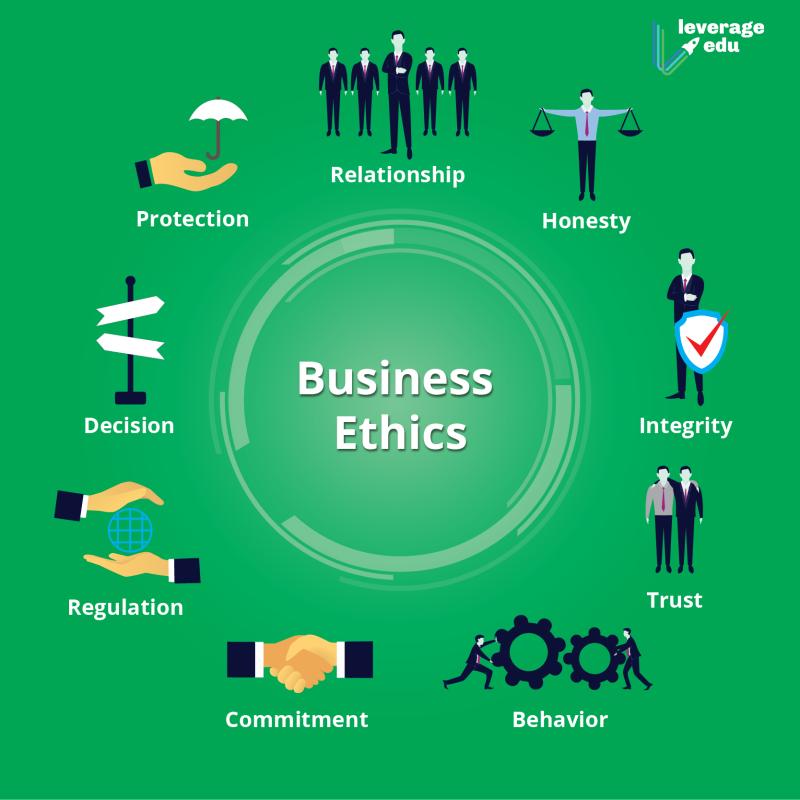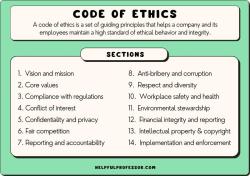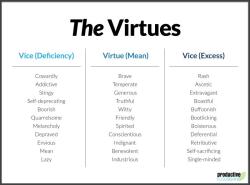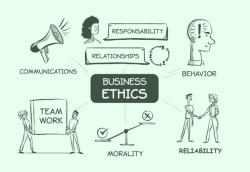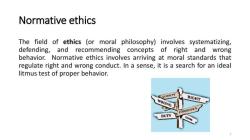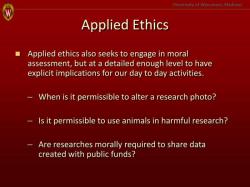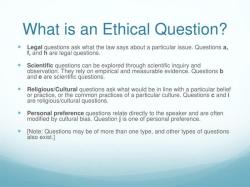What is business ethics?
Business ethics refers to the application of ethical principles and moral values in the context of business activities and decision-making. It involves the consideration of moral and social implications in the conduct of business, and it encompasses a wide range of issues, from individual behavior and corporate governance to environmental responsibility and social impact.
Key aspects of business ethics include:
Integrity:
- Upholding honesty and truthfulness in all business dealings. This includes being transparent, fair, and straightforward in communication and actions.
Responsibility:
- Acknowledging and accepting the consequences of business decisions and actions. This involves considering the impact on stakeholders, including employees, customers, communities, and the environment.
Fairness:
- Ensuring fair and equitable treatment of all stakeholders, both within the organization and in external relationships. This principle extends to issues such as fair wages, fair competition, and fair marketing practices.
Respect for Others:
- Recognizing the dignity, rights, and diversity of individuals. Business ethics requires treating employees, customers, suppliers, and competitors with respect and avoiding discrimination or exploitation.
Transparency:
- Providing clear, accurate, and accessible information to stakeholders. Transparency fosters trust and accountability and is crucial for ethical business practices.
Lawfulness:
- Complying with applicable laws and regulations. While legality and ethics are not always synonymous, adhering to the law is a fundamental aspect of ethical business conduct.
Accountability:
- Taking responsibility for one's actions and decisions. Ethical business leaders and organizations are accountable for their behavior and are willing to rectify any negative consequences.
Sustainability:
- Considering the long-term environmental, social, and economic impact of business activities. Sustainable business practices aim to minimize negative effects and contribute positively to the well-being of future generations.
Corporate Social Responsibility (CSR):
- Going beyond legal obligations to actively contribute to the well-being of society. This includes philanthropy, community engagement, and initiatives that address social and environmental issues.
Whistleblower Protection:
- Encouraging and protecting individuals who report unethical behavior within the organization. Whistleblower protection is crucial for maintaining transparency and addressing wrongdoing.
Conflict of Interest Management:
- Identifying and managing situations where personal interests may conflict with the interests of the organization. Ethical businesses establish clear policies to address and prevent conflicts of interest.
Ethical Decision-Making:
- Implementing processes that guide individuals and organizations in making ethical decisions. Ethical decision-making involves considering the consequences of actions and evaluating them against ethical principles.
Anti-Corruption Practices:
- Taking a strong stance against bribery, corruption, and unethical practices. Ethical businesses actively promote anti-corruption measures and create a culture of integrity.
Global Considerations:
- Recognizing the impact of business activities on a global scale. Ethical considerations extend beyond local laws and norms, taking into account the broader implications of business decisions in a global context.
Business ethics is essential for building trust, maintaining a positive reputation, and fostering long-term relationships with stakeholders. Organizations that prioritize ethical conduct contribute to a more sustainable and responsible business environment. Ethical behavior is not only a legal requirement but also a strategic imperative for business success and societal well-being.
Business Ethics: Definition, Application, and Impact
1. Defining Business Ethics:
Business ethics encompasses the principles, standards, and values that guide decision-making and behavior within the business world. It addresses the moral and social implications of business activities, promoting fairness, transparency, and social responsibility.
Business ethics goes beyond mere legal compliance. It aims to ensure that business practices align with ethical principles, even when not explicitly mandated by law. This includes considerations such as:
- Honesty and integrity: Acting with truthfulness and transparency in all business dealings.
- Fairness and justice: Treating all stakeholders, including employees, customers, and competitors, with fairness and respect.
- Accountability: Taking responsibility for the impact of business decisions on individuals and society.
- Sustainability: Balancing economic goals with environmental and social responsibility, promoting practices that ensure the well-being of future generations.
2. Ethical Principles in Business Operations:
Ethical principles apply across various aspects of business operations, including:
- Marketing and sales: Avoiding deceptive advertising, respecting consumer privacy, and ensuring fair pricing practices.
- Human resources: Providing safe and fair working conditions, respecting employee rights, and promoting diversity and inclusion.
- Finance and accounting: Maintaining transparency in financial reporting, avoiding fraud and corruption, and acting with financial responsibility.
- Supply chain management: Ensuring ethical sourcing of materials, respecting labor rights throughout the supply chain, and promoting sustainable practices.
- Corporate governance: Upholding high standards of transparency, accountability, and ethical leadership.
3. Building Trust and Credibility:
Strong business ethics play a crucial role in fostering trust and credibility in organizations:
- Enhances brand reputation: Companies with a reputation for ethical conduct attract and retain customers, investors, and talented employees.
- Improves risk management: Ethical practices minimize legal and regulatory risks, protecting the company's reputation and financial stability.
- Empowers employees: Employees feel more engaged and motivated when they work for a company that aligns with their values.
- Boosts stakeholder confidence: Investors, consumers, and communities trust organizations that demonstrate ethical behavior.
- Promotes social good: Ethical businesses contribute to a positive social impact, creating a more just and sustainable world.
By integrating ethical principles into their operations, businesses can build stronger relationships with stakeholders, enhance their reputation, and contribute to a positive social impact. This ultimately leads to long-term success and sustainability for businesses and the communities they operate in.
